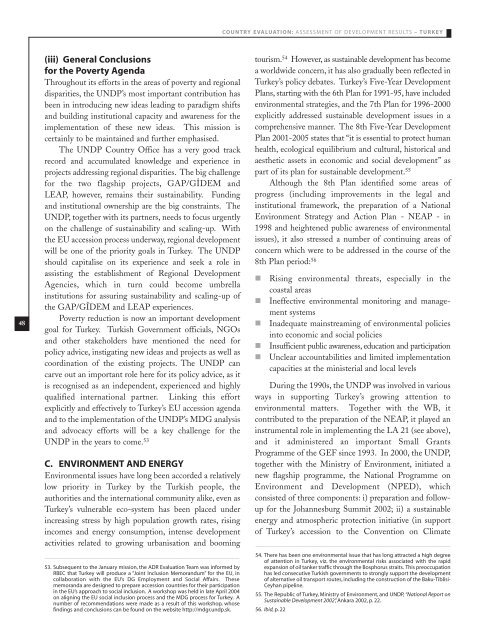Reports - United Nations Development Programme
Reports - United Nations Development Programme
Reports - United Nations Development Programme
You also want an ePaper? Increase the reach of your titles
YUMPU automatically turns print PDFs into web optimized ePapers that Google loves.
COUNTRY EVALUATION: ASSESSMENT OF DEVELOPMENT RESULTS – TURKEY<br />
48<br />
(iii) General Conclusions<br />
for the Poverty Agenda<br />
Throughout its efforts in the areas of poverty and regional<br />
disparities, the UNDP’s most important contribution has<br />
been in introducing new ideas leading to paradigm shifts<br />
and building institutional capacity and awareness for the<br />
implementation of these new ideas. This mission is<br />
certainly to be maintained and further emphasised.<br />
The UNDP Country Office has a very good track<br />
record and accumulated knowledge and experience in<br />
projects addressing regional disparities. The big challenge<br />
for the two flagship projects, GAP/GI˚DEM and<br />
LEAP, however, remains their sustainability. Funding<br />
and institutional ownership are the big constraints. The<br />
UNDP, together with its partners, needs to focus urgently<br />
on the challenge of sustainability and scaling-up. With<br />
the EU accession process underway, regional development<br />
will be one of the priority goals in Turkey. The UNDP<br />
should capitalise on its experience and seek a role in<br />
assisting the establishment of Regional <strong>Development</strong><br />
Agencies, which in turn could become umbrella<br />
institutions for assuring sustainability and scaling-up of<br />
the GAP/GI˚DEM and LEAP experiences.<br />
Poverty reduction is now an important development<br />
goal for Turkey. Turkish Government officials, NGOs<br />
and other stakeholders have mentioned the need for<br />
policy advice, instigating new ideas and projects as well as<br />
coordination of the existing projects. The UNDP can<br />
carve out an important role here for its policy advice, as it<br />
is recognised as an independent, experienced and highly<br />
qualified international partner. Linking this effort<br />
explicitly and effectively to Turkey’s EU accession agenda<br />
and to the implementation of the UNDP’s MDG analysis<br />
and advocacy efforts will be a key challenge for the<br />
UNDP in the years to come. 53<br />
C. ENVIRONMENT AND ENERGY<br />
Environmental issues have long been accorded a relatively<br />
low priority in Turkey by the Turkish people, the<br />
authorities and the international community alike, even as<br />
Turkey’s vulnerable eco-system has been placed under<br />
increasing stress by high population growth rates, rising<br />
incomes and energy consumption, intense development<br />
activities related to growing urbanisation and booming<br />
————————————————————————————————————<br />
53. Subsequent to the January mission, the ADR Evaluation Team was informed by<br />
RBEC that Turkey will produce a “Joint Inclusion Memorandum” for the EU, in<br />
collaboration with the EU’s DG Employment and Social Affairs. These<br />
memoranda are designed to prepare accession countries for their participation<br />
in the EU’s approach to social inclusion. A workshop was held in late April 2004<br />
on aligning the EU social inclusion process and the MDG process for Turkey. A<br />
number of recommendations were made as a result of this workshop, whose<br />
findings and conclusions can be found on the website http://mdgr.undp.sk.<br />
tourism. 54 However, as sustainable development has become<br />
a worldwide concern, it has also gradually been reflected in<br />
Turkey’s policy debates. Turkey’s Five-Year <strong>Development</strong><br />
Plans, starting with the 6th Plan for 1991-95, have included<br />
environmental strategies, and the 7th Plan for 1996-2000<br />
explicitly addressed sustainable development issues in a<br />
comprehensive manner. The 8th Five-Year <strong>Development</strong><br />
Plan 2001-2005 states that “it is essential to protect human<br />
health, ecological equilibrium and cultural, historical and<br />
aesthetic assets in economic and social development” as<br />
part of its plan for sustainable development. 55<br />
Although the 8th Plan identified some areas of<br />
progress (including improvements in the legal and<br />
institutional framework, the preparation of a National<br />
Environment Strategy and Action Plan - NEAP - in<br />
1998 and heightened public awareness of environmental<br />
issues), it also stressed a number of continuing areas of<br />
concern which were to be addressed in the course of the<br />
8th Plan period: 56<br />
<br />
<br />
<br />
<br />
<br />
Rising environmental threats, especially in the<br />
coastal areas<br />
Ineffective environmental monitoring and management<br />
systems<br />
Inadequate mainstreaming of environmental policies<br />
into economic and social policies<br />
Insufficient public awareness, education and participation<br />
Unclear accountabilities and limited implementation<br />
capacities at the ministerial and local levels<br />
During the 1990s, the UNDP was involved in various<br />
ways in supporting Turkey’s growing attention to<br />
environmental matters. Together with the WB, it<br />
contributed to the preparation of the NEAP, it played an<br />
instrumental role in implementing the LA 21 (see above),<br />
and it administered an important Small Grants<br />
<strong>Programme</strong> of the GEF since 1993. In 2000, the UNDP,<br />
together with the Ministry of Environment, initiated a<br />
new flagship programme, the National <strong>Programme</strong> on<br />
Environment and <strong>Development</strong> (NPED), which<br />
consisted of three components: i) preparation and followup<br />
for the Johannesburg Summit 2002; ii) a sustainable<br />
energy and atmospheric protection initiative (in support<br />
of Turkey’s accession to the Convention on Climate<br />
————————————————————————————————————<br />
54. There has been one environmental issue that has long attracted a high degree<br />
of attention in Turkey, viz. the environmental risks associated with the rapid<br />
expansion of oil tanker traffic through the Bosphorus straits. This preoccupation<br />
has led consecutive Turkish governments to strongly support the development<br />
of alternative oil transport routes, including the construction of the Baku-Tiblisi-<br />
Ceyhan pipeline.<br />
55. The Republic of Turkey, Ministry of Environment, and UNDP, “National Report on<br />
Sustainable <strong>Development</strong> 2002”, Ankara 2002, p. 22.<br />
56. Ibid, p. 22

















